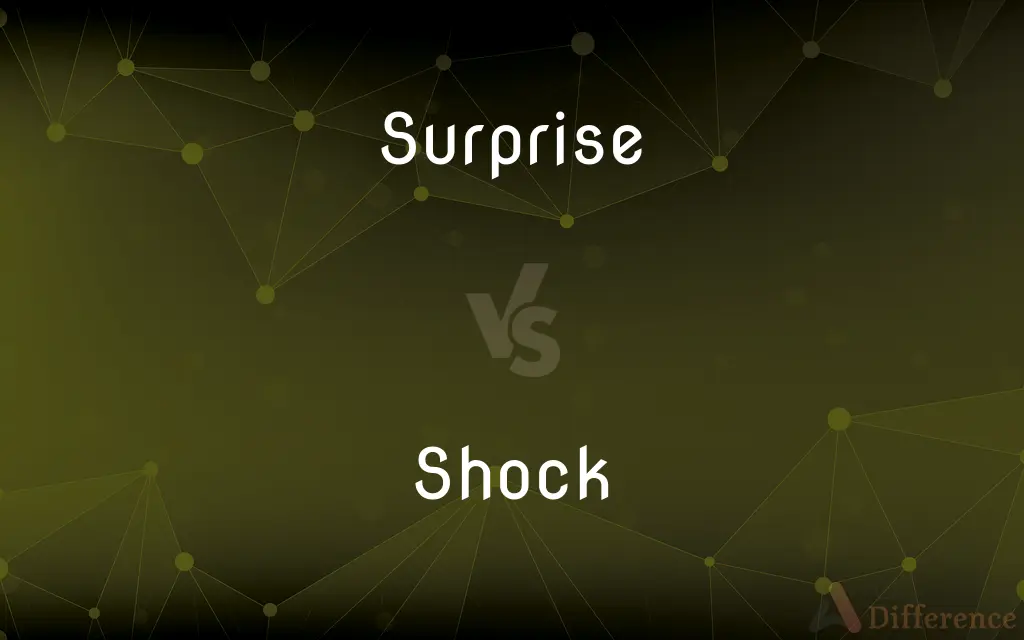Surprise vs. Shock — What's the Difference?
By Urooj Arif & Maham Liaqat — Updated on May 2, 2024
Surprise involves unexpected events that can be pleasant or neutral, while shock denotes a sudden, often negative emotional impact.

Difference Between Surprise and Shock
Table of Contents
ADVERTISEMENT
Key Differences
Surprise is a sudden feeling when something unexpected happens, sparking curiosity or delight. In contrast, shock is a more intense emotional response, usually to something disturbing or upsetting.
A surprise can enhance a celebration or add excitement to a routine day, whereas shock might result in disbelief or a strong sense of disturbance.
People often enjoy surprises that come in the form of gifts or good news, while shocks are generally associated with undesirable outcomes like accidents or shocking news.
Surprises are often designed and planned, such as surprise parties or unexpected rewards, whereas shocks come without warning and are rarely planned, like natural disasters or tragic incidents.
In terms of physiology, surprise can cause a quick heartbeat or a momentary pause, but shock can trigger a more profound bodily response, including freezing on the spot or a panic reaction.
ADVERTISEMENT
Comparison Chart
Emotional Tone
Can be positive or neutral
Generally negative
Intensity
Mild to moderate
High
Expectation
Unexpected but often welcomed
Unexpected and often unwelcomed
Physiological Response
Elevated heartbeat, smiling
Freezing, panic, distress
Examples
Surprise party, unexpected gift
Accident, distressing news
Compare with Definitions
Surprise
The act of surprising someone.
Planning a surprise for her involved coordinating with all her friends secretly.
Shock
An acute medical condition associated with a fall in blood pressure.
The paramedics treated him for shock at the scene.
Surprise
A sudden feeling of wonder or astonishment.
Her surprise was evident when she found her friends waiting at her home for a birthday party.
Shock
A sudden upsetting or surprising event or experience.
The news of the earthquake came as a shock to the community.
Surprise
To encounter or discover unexpectedly.
He surprised everyone by arriving early at the meeting.
Shock
To cause someone to feel horror or disgust.
The documentary is designed to shock its audience into action.
Surprise
An unexpected event or fact.
The announcement of the winner was a complete surprise to everyone in the room.
Shock
The feeling of distress and disbelief that you have when something bad happens unexpectedly.
She stood in shock as she watched the house burn down.
Surprise
Something that is surprising.
The twist at the end of the movie was a pleasant surprise.
Shock
A severe disturbance in the emotions or actions caused by stress or trauma.
He was in shock for days after the accident.
Surprise
To cause to feel wonder, astonishment, or amazement, as at something unanticipated
Thinking I was at home, she was surprised to see me in the office. We were surprised that he could recover so quickly.
Shock
A violent collision, impact, or explosion, or the force or movement resulting from this
The shock of the explosion blew out windows of every building on the street.
Surprise
To encounter or discover suddenly or unexpectedly; take or catch unawares
She surprised him as he was reading her diary.
Shock
A sudden feeling of distress
The shock of the news has not yet worn off.
Surprise
To attack or capture suddenly and without warning
Surprised the sentries in a predawn raid, wounding several.
Shock
The sensation and muscular spasm caused by an electric current passing through the body or a body part.
Surprise
To cause (someone) to do or say something unintended or to be in an unintended condition
"There passed a scene ... that surprised me into courage to come forward" (Fanny Burney).
Shock
A sudden economic disturbance, such as a rise in the price of a commodity.
Surprise
To elicit or detect through surprise
"She occasionally surprised a look on Jemima's face" (Marcia Willett).
Shock
A shock absorber.
Surprise
The act of surprising or the condition of being surprised
Imagine my surprise on seeing you here.
Shock
A number of sheaves of grain stacked upright in a field for drying.
Surprise
Something, such as an unexpected encounter, event, or gift, that surprises.
Shock
A thick heavy mass
A shock of white hair.
Surprise
Something unexpected.
It was a surprise to find out I owed twice as much as I thought I did.
Shock
To surprise and disturb greatly
We were shocked by his admission of wrongdoing.
Surprise
The feeling that something unexpected has happened.
Imagine my surprise on learning I owed twice as much as I thought I did.
Shock
To induce a state of physical shock in (an animal or person).
Surprise
(transitive) To cause (someone) to feel unusually alarmed or delighted by something unexpected.
It surprises me that I owe twice as much as I thought I did.
Shock
To subject (an animal or person) to an electric shock.
Surprise
(transitive) To do something to (a person) that they are not expecting, as a surprise.
He doesn’t know that I’m in the country – I thought I’d turn up at his house and surprise him.
Shock
To administer electric current to (a patient) to treat cardiac arrest or life-threatening arrhythmias.
Surprise
(intransitive) To undergo or witness something unexpected.
He doesn’t surprise easily.
Shock
To administer electroconvulsive therapy to (a patient).
Surprise
(intransitive) To cause surprise.
Shock
To come into contact violently, as in battle; collide.
Surprise
(transitive) To attack unexpectedly.
Shock
To gather (grain) into shocks.
Surprise
(transitive) To take unawares.
Shock
A sudden, heavy impact.
The train hit the buffers with a great shock.
Surprise
The act of coming upon, or taking, unawares; the act of seizing unexpectedly; surprisal; as, the fort was taken by surprise.
Shock
(figuratively) Something so surprising that it is stunning.
Surprise
The state of being surprised, or taken unawares, by some act or event which could not reasonably be foreseen; emotion excited by what is sudden and strange; a suddenly excited feeling of wonder or astonishment.
Pure surprise and fearMade me to quit the house.
Shock
(psychology) A sudden or violent mental or emotional disturbance.
Surprise
Anything that causes such a state or emotion.
Shock
(medicine) Electric shock, a sudden burst of electrical energy hitting a person or animal.
Surprise
A dish covered with a crust of raised paste, but with no other contents.
Shock
(medicine) Circulatory shock, a medical emergency characterized by the inability of the circulatory system to supply enough oxygen to meet tissue requirements.
Surprise
To come or fall suddenly and unexpectedly; to take unawares; to seize or capture by unexpected attack.
Fearfulness hath surprised the hypocrites.
The castle of Macduff I will surprise.
Who can speakThe mingled passions that surprised his heart?
Shock
(physics) A shock wave.
Several reflected shocks enter the bomb core in rapid succession, each helping to compress it to its maximum density.
Surprise
To strike with wonder, astonishment, or confusion, by something sudden, unexpected, or remarkable; to confound; as, his conduct surprised me.
I am surprised with an uncouth fear.
Up he starts,Discovered and surprised.
Shock
A shock absorber (typically in the suspension of a vehicle).
If your truck's been riding rough, it might need new shocks.
Surprise
To lead (one) to do suddenly and without forethought; to bring (one) into some unexpected state; - with into; as, to be surprised into an indiscretion; to be surprised into generosity.
Shock
(mathematics) A discontinuity arising in the solution of a partial differential equation.
Surprise
To hold possession of; to hold.
Not with me,That in my hands surprise the sovereignity.
Shock
A chemical added to a swimming pool to moderate the chlorine levels.
Surprise
The astonishment you feel when something totally unexpected happens to you
Shock
An arrangement of sheaves for drying; a stook.
Surprise
A sudden unexpected event
Shock
A lot consisting of sixty pieces; a term applied in some Baltic ports to loose goods.
Surprise
The act of surprising someone
Shock
(by extension) A tuft or bunch of something, such as hair or grass.
His head boasted a shock of sandy hair.
Surprise
Cause to be surprised;
The news really surprised me
Shock
(obsolete) A small dog with long shaggy hair, especially a poodle or spitz; a shaggy lapdog.
Surprise
Come upon or take unawares;
She surprised the couple
He surprised an interesting scene
Shock
Causing intense surprise, horror, etc.; unexpected and shocking.
His shock announcement rocked the tennis world.
Surprise
Attack by storm; attack suddenly
Shock
(transitive) To cause to be emotionally shocked; to cause (someone) to feel surprised and upset.
The disaster shocked the world.
Shock
(transitive) To give an electric shock to.
Shock
(transitive) To subject to a shock wave or violent impact.
Ammonium nitrate can detonate if severely shocked.
Shock
To meet with a shock; to collide in a violent encounter.
Shock
(transitive) To add a chemical to (a swimming pool) to moderate the chlorine levels.
Shock
(transitive) To collect, or make up, into a shock or shocks; to stook.
To shock rye
Shock
A pile or assemblage of sheaves of grain, as wheat, rye, or the like, set up in a field, the sheaves varying in number from twelve to sixteen; a stook.
And cause it on shocks to be by and by set.
Behind the master walks, builds up the shocks.
Shock
A lot consisting of sixty pieces; - a term applied in some Baltic ports to loose goods.
Shock
A quivering or shaking which is the effect of a blow, collision, or violent impulse; a blow, impact, or collision; a concussion; a sudden violent impulse or onset.
These strong, unshaken mounds resist the shocksOf tides and seas tempestuous.
He stood the shock of a whole host of foes.
Shock
A sudden agitation of the mind or feelings; a sensation of pleasure or pain caused by something unexpected or overpowering; also, a sudden agitating or overpowering event.
Shock
A sudden depression of the vital forces of the entire body, or of a port of it, marking some profound impression produced upon the nervous system, as by severe injury, overpowering emotion, or the like.
Shock
The sudden convulsion or contraction of the muscles, with the feeling of a concussion, caused by the discharge, through the animal system, of electricity from a charged body.
Shock
A dog with long hair or shag; - called also shockdog.
Shock
A thick mass of bushy hair; as, a head covered with a shock of sandy hair.
Shock
To collect, or make up, into a shock or shocks; to stook; as, to shock rye.
Shock
To be occupied with making shocks.
Reap well, scatter not, gather clean that is shorn,Bind fast, shock apace.
Shock
To give a shock to; to cause to shake or waver; hence, to strike against suddenly; to encounter with violence.
Come the three corners of the world in arms,And we shall shock them.
I shall never forget the force with which he shocked De Vipont.
Shock
To strike with surprise, terror, horror, or disgust; to cause to recoil; as, his violence shocked his associates.
Advise him not to shock a father's will.
Shock
To subject to the action of an electrical discharge so as to cause a more or less violent depression or commotion of the nervous system.
Shock
To meet with a shock; to meet in violent encounter.
Shock
Bushy; shaggy; as, a shock hair.
His red shock peruke . . . was laid aside.
Shock
The violent interaction of individuals or groups entering into combat;
The armies met in the shock of battle
Shock
A reflex response to the passage of electric current through the body;
Subjects received a small electric shock when they mae the wrong response
Electricians get accustomed to occasional shocks
Shock
An instance of agitation of the earth's crust;
The first shock of the earthquake came shortly after noon while workers were at lunch
Shock
An unpleasant or disappointing surprise;
It came as a shock to learn that he was injured
Shock
A pile of sheaves of grain set on end in a field to dry; stalks of Indian corn set up in a field;
Corn is bound in small sheeves and several sheeves are set up together in shocks
Whole fields of wheat in shock
Shock
A bushy thick mass (especially hair);
He had an unruly shock of black hair
Shock
A mechanical damper; absorbs energy of sudden impulses;
The old car needed a new set of shocks
Shock
Surprise greatly; knock someone's socks off;
I was floored when I heard that I was promoted
Shock
Strike with disgust or revulsion;
The scandalous behavior of this married woman shocked her friends
Shock
Strike with horror or terror;
The news of the bombing shocked her
Shock
Collide violently
Shock
Collect or gather into shocks;
Shock grain
Shock
Subject to electrical shocks
Shock
Inflict a trauma upon
Common Curiosities
How can one differentiate between a pleasant surprise and a shock?
A pleasant surprise usually brings joy and excitement, whereas shock brings distress, discomfort, or horror
What is a typical physiological response to shock?
Typical responses include a rapid heartbeat, hyperventilation, or a feeling of numbness.
What is a common cause of surprise?
Common causes of surprise include unexpected gifts, sudden good news, or unanticipated actions by others.
How do people typically react to surprises?
Reactions to surprises can vary widely but often include expressions of joy, laughter, or momentary confusion.
What can trigger a shock in everyday life?
Everyday triggers of shock can include receiving sudden bad news, witnessing an accident, or experiencing a betrayal.
Is shock always related to negative events?
While shock is often associated with negative events, it can also result from overwhelmingly positive news that is hard to process immediately.
How can one prepare for or manage the effects of shock?
Preparation involves psychological readiness for unexpected events and having coping strategies in place, such as stress management techniques or support networks.
How do surprises affect our mood?
Surprises generally uplift our mood by introducing a sense of novelty and excitement, making ordinary moments feel special.
What is the role of expectation in feeling surprised or shocked?
Expectation plays a crucial role; the less one anticipates an event, the greater the surprise or shock when it occurs.
Can shock have long-term effects?
Yes, particularly emotional or psychological shock can lead to long-term effects like PTSD or anxiety disorders.
What differentiates a surprise from a shock in terms of duration of impact?
Surprises often have a short-term impact, creating a momentary thrill or joy, whereas shocks can have a lasting emotional and psychological impact, necessitating more time to recover.
What are some typical scenarios where someone might experience a surprise?
Typical scenarios include unexpected visits from friends, winning a prize, or discovering something new and delightful unexpectedly.
What are some physical signs that someone is experiencing shock?
Physical signs include pale skin, sweating, rapid breathing, and sometimes a blank or dazed expression.
How do children typically react to surprises compared to adults?
Children may show more overt enthusiasm and wonder in response to surprises, while adults might react with more reserved or mixed emotions.
Can animals experience surprise or shock?
Yes, animals can experience both, often evidenced by sudden behavioral changes like jumping or running away in response to unexpected stimuli.
Share Your Discovery

Previous Comparison
GHz vs. MHz
Next Comparison
Ecosystem vs. EcologyAuthor Spotlight
Written by
Urooj ArifUrooj is a skilled content writer at Ask Difference, known for her exceptional ability to simplify complex topics into engaging and informative content. With a passion for research and a flair for clear, concise writing, she consistently delivers articles that resonate with our diverse audience.
Co-written by
Maham Liaqat












































